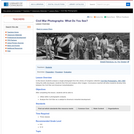
Students use Library of Congress primary sources to examine the Civil War and American industrialization.
- Subject:
- History
- U.S. History
- Material Type:
- Lesson
- Lesson Plan
- Provider:
- Library of Congress
- Provider Set:
- Lesson Plans
- Date Added:
- 07/07/2000

Students use Library of Congress primary sources to examine the Civil War and American industrialization.
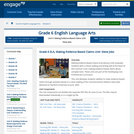
Making Evidence-Based Claims ELA/Literacy Units empower students with a critical reading and writing skill at the heart of the Common Core: making evidence-based claims about complex texts. These units are part of the Developing Core Proficiencies Program. This unit develops students' abilities to make evidence-based claims through activities based on a close reading of the Commencement Address Steve Jobs delivered at Stanford University on June, 2005.
Find the rest of the EngageNY ELA resources at https://archive.org/details/engageny-ela-archive .
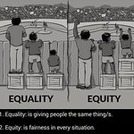
This lesson is designed for students to learn basic social justice vocabulary, such as systemic racism and analyze if equity matters. Through vocabulary development of terms around race relations and equity, along with the analysis of two articles, students will gain an understanding of equity in social organizations. Finally, using the articles, the content-specific vocabulary and their own schema, students will discuss if equity matters in a Socratic seminar.

Drumbeats in Time is a collaborative effort between the Thorp School District and members of the Kittitas Band of the Yakama Nation. These units are designed to integrate local Native American oral history and interview skills into the social studies curriculum to help students gain understanding of the life and times of various members of the Kittitas Valley.The sixth grade unit focuses on accounts of modern life and past life in order to develop an understanding of cultural awarness in the future.
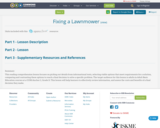
This reading comprehension lesson focuses on picking out details from informational texts, selecting viable options that meet requirements for a solution, comparing and contrasting these options to reach a final decision to solve a specific problem. The target audience for this lesson is adults in Adult Basic Education courses at a CCRS Anchor 2, Grade D. This lesson will help learners to effectively review information, and assess the costs and benefits of a final decision they make.

This lesson guides students in an examination of a poet's use of figurative language and word choice to convey themes of belonging and identity. Students will delve into the concept of the unit theme, “Belonging” and the essential question, "In what ways does our need to feel a sense of belonging conflict with our individuality?" Students will write a short essay analyzing the ways in which a poet uses figurative language and word choice to convey the speaker's sense of him/herself as an individual and as someone who feels he/she is not accepted. Image source: "Attain" by Nick Youngson from TheBlueDiamondGallery.com at http://thebluediamondgallery.com/tablet-dictionary/a/attain.html Creative Commons 3 - CC BY-SA 3.0

This lesson focuses on the chapter “Chinatown” from Laurence Yep’s memoir, The Lost Garden. Students will consider the factors that contributed to Yep’s struggle to find a sense of belonging with his peers and in his community. Students will determine in what ways the essential question (In what ways does our need to feel a sense of belonging conflict with our individuality?) is relevant to Laurence Yep’s experience as he describes it in “Chinatown”.
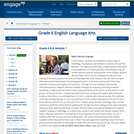
In this module, students are involved in a deep study of mythology, its purposes, and elements. Students will read Rick Riordan’s The Lightning Thief (780L), a high-interest novel about a sixth-grade boy on a hero’s journey. Some students may be familiar with this popular fantasy book; in this module, students will read with a focus on the archetypal journey and close reading of the many mythical allusions. As they begin the novel, students also will read a complex informational text that explains the archetypal storyline of the hero’s journey which has been repeated in literature throughout the centuries. Through the close reading of literary and informational texts, students will learn multiple strategies for acquiring and using academic vocabulary. Students will also build routines and expectations of discussion as they work in small groups. At the end of Unit 1, having read half of the novel, students will explain, with text-based evidence, how Percy is an archetypal hero. In Unit 2, students will continue reading The Lightning Thief (more independently): in class, they will focus on the novel’s many allusions to classic myths; those allusions will serve as an entry point into a deeper study of Greek mythology. They also will continue to build their informational reading skills through the close reading of texts about the close reading of texts about the elements of myths. This will create a conceptual framework to support students’ reading of mythology. As a whole class, students will closely read several complex Greek myths. They then will work in small groups to build expertise on one of those myths. In Unit 3, students shift their focus to narrative writing skills. This series of writing lessons will scaffold students to their final performance task in which they will apply their knowledge about the hero’s journey and the elements of mythology to create their own hero’s journey stories.
Find the rest of the EngageNY ELA resources at https://archive.org/details/engageny-ela-archive .
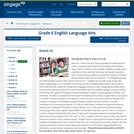
What are “rules to live by”? How do people formulate and use “rules” to improve their lives? How do people communicate these “rules” to others? In this module, students consider these questions as they read the novel Bud, Not Buddy, Steve Jobs’ 2005 commencement address at Stanford University, President Barack Obama’s Back-to-School Speech, “If” by Rudyard Kipling, and informational research texts. At the start of Unit 1, students launch their study of Bud, Not Buddy, establishing a set of routines for thinking, writing, and talking about Bud’s rules to live by. They read the novel closely for its figurative language and word choice, analyzing how these affect the tone and meaning of the text. In the second half of the unit, students engage in a close reading of the Steve Jobs speech, focusing on how Jobs develops his ideas at the paragraph, sentence, and word level. Students use details from the speech to develop claims about a larger theme. During Unit 2, students continue to explore the theme of “rules to live by” in the novel as well as through close reading of the poem “If” by Rudyard Kipling. Students analyze how the structure of a poem contributes to its meaning and theme. In a mid-unit assessment, students compare and contrast how Bud, Not Buddy and “If” address a similar theme. Unit 2 culminates with students writing a literary argument essay in which they establish a claim about how Bud uses his “rules”: to survive or to thrive. Students substantiate their claim using specific text-based evidence including relevant details and direct quotations from the novel. In Unit 3, students shift their focus to their own rules to live by and conduct a short research project. Students work in expert groups (research teams) to use multiple informational sources to research that topic. As a final performance task, students use their research to write an essay to inform about one important “rule to live by” supported with facts, definitions, concrete details, quotations, and examples.
Find the rest of the EngageNY ELA resources at https://archive.org/details/engageny-ela-archive .

Students will receive exposure to new vocabulary, then read and annotate an article, discuss, and engage in a writing exercise, focused on the Iroquois Confederacy.

Every media source has a story to tell--a driving purpose. The media that people consume largely shapes their world views. The US public is becoming more divided partially due to the consumption of increasingly biased news. As a critical consumer of media, It is important to be able to separate fact from opinion. In this unit, adapted from the high school version, students will become critical consumers of news, by identifying media bias in order to become better informed citizens. NOTE: This unit has been adapted for use at the middle school level from the resource Identifying Media Bias in News Sources by Sandra Stroup, Sally Drendel, Greg Saum, and Heidi Morris.

As part of Washington's Kip Tokuda Memorial Civil Liberties Public Education Program, which strives to educate the public regarding the history and the lessons of the World War II exclusion, removal, and detention of persons of Japanese ancestry, KSPS Public Television and Eastern Washington educators Starla Fey, Leslie Heffernan, and Morgen Larsen have produced Injustice at Home: the Japanese American experience of the World War II Era.
This educational resource--five educational videos and an inquiry-based unit of study--will help students understand Executive Order 9066 and the resulting internment of Japanese-Americans during World War II, the failure of political leadership to protect constitutional rights, the military experience of Japanese-Americans during WWII, and examples of discrimination and racial prejudice the Japanese-American community faced before, during and after WWII.
In addition, students will analyze the short and long term emotional effects on those who are incarcerated, identify the challenges that people living outside of the exclusion zone faced, examine how some Japanese Americans showed their loyalty during the period of incarceration, and learn about brave individuals who stood up for Japanese Americans during this time.
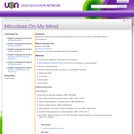
In this lesson students will observe and read about microorganisms so that they can create an information book on microorganisms.
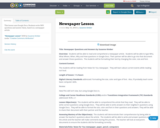
This lesson uses Google Docs. Students write WH questions and answer them, based on a newspaper article.

Discover the history around delicious doughnuts.
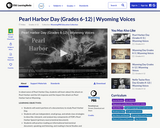
Students will learn about the attack on Pearl Harbor and the US response of the Pearl Harbor Day observance.
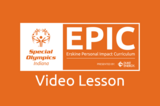
Story tells how Carl Erskine became lifelong friends with Johnny Wilson, then Jackie Robinson. Also, learn the story of how Carl compares his World Series ring and son Jimmy’s Special Olympics medal.32 pages Suggested for grades 4-6 ISBN: 979-8-9863985-1-8Library of Congress: GV861. L87 B76 2022
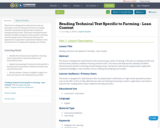
This lesson is designed for adult learners who are pursuing a career in farming. It focuses on reading scientific and technical texts (Grade 6) related to farming and farm loans. This lesson will help learners identify and define technical words specific to farming and borrowing money. The learners will have the opportunity to apply their acquired knowledge in class activities such as reading and analyzing case studies.

This inquiry unit leads students through the different perspectives behind a decision to have a dam removed. This unit looks at similar Washington state dam removal decisions as well as the complex issue of having the Election dam removed near Puyallup, WA. Students will be introduced to the stories and traditional ways of knowing about salmon that the Puyallup Tribe has built their culture upon. Then they will explore the science behind hydroelectricity and build models to discover how carbon neutral energy is gathered through hydro dams. This inquiry unit ends with students researching different perspectives surrounding the current (2021) decision to remove the Electron dam including: the Tribe’s Fishery department, the ecosystem, the city council, the fishermen and the hydro-electrical company who currently owns the dam. With their research, students will do a socratic seminar to mimic the court case lawsuit that is ongoing against the Electron Dam.

Objectives of this mini unit:For students to explore the "universal call to action" laid out in the Sustainable Development Goals (SDGs) and consider how they may respond to that call;Build background knowledge about specific issues impacting the Arctic including: indigenous rights, indigenous health, biodiversity, tourism and marine pollution; Build background knowledge about specific issues impacting their local communtiy (using Michigan as a case-study) including: hunger, homelessness, poverty, youth violence and the environment;Create an action plan to address needs within their local communities driven by their unique passions, interests and skills;Consider the importance of impact vs intention when engaging with community action projects